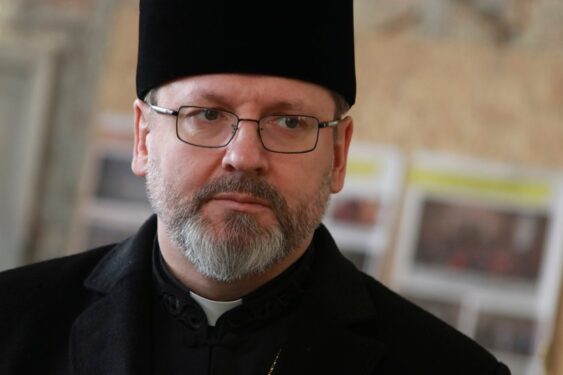By Inés San Martín
ROME (Crux) — According to the leader of the Ukrainian Greek Catholic Church, the crimes being committed under the leadership of Russian Vladimir Putin during the invasion of Ukraine call to mind those of Soviet dictator Joseph Stalin.

With tears in his eyes and visibly emotional, Major Archbishop Sviatoslav Shevchuk said, “the strength of the Ukrainian people is revealing itself as a miracle that surprises the world.” However, because the Russian army was unable to “make a blitzkrieg” successful, Putin is carrying out a “war of total destruction.”
[Related: Polish Archbishop Updates Pope on aid to Ukraine Refugees]
The bombings are constant, he said, and over 200,000 Russian soldiers have entered Ukrainian soil, making it a “miracle” that there still is electricity and internet in Kyiv, because infrastructure, including hospitals, is being targeted. “They are bombing cities and towns.”
Archbishop Shevchuk also claimed that when Russia invaded Ukraine on Feb. 24, his name was on a list of people “to be eliminated,” and his cathedral had been infiltrated by people who were supposed to carry out the hit.
He also expressed his pride in the fact that the priests and bishops he leads have remained in the country to help their people, and the courage shown by Ukrainians so far.
“We wonder, how do we save the people. How do we help the people? How do we bring aid to the weakest ones?” he asked. “Never had we imagined that the basements of our cathedrals would become bomb shelters.”
Archbishop Shevchuk also claimed that in the Donbas region — first invaded by Russia in 2014 — more than 40,000 people have been forcibly deported, with their passports taken away to be replaced by temporary documents with which they are sent to labor camps on an island in the Pacific Ocean close to Japan.
“This truly reminds [us] of Stalin’s deportations, of those [sent to] Siberia,” he said fighting back tears. “They are children, women, disabled. What awaits these people? What future will they have? They will certainly die.”
Archbishop Shevchuk’s words came during an online event organized by Rome’s Pontifical Oriental Institute. Also taking part in the event were Cardinal Leonardo Sandri, Prefect of the Congregation for the Oriental Churches and Grand Chancellor of the Institute; Tetiana Stawnychy, president of Caritas Ukraine; and Cardinal Michael Czerny, who has been dispatched to Ukraine twice by Pope Francis since the invasion began.
Archbishop Shevchuk spoke of devastated cities, such as Mariupol, claiming that the Russian army had banned humanitarian aid, leading to many dying not only as a result of the constant shelling but of hunger.
The prelate also expressed his thanks to Pope Francis, who “called me on the second day of the war,” and personally promised to “do everything that I can” to stop the war. He said the Vatican’s Secretariat of State, together with the pontiff, “is doing everything possible to stop this massacre of innocents in Ukraine.”
Referring to the pontiff’s consecration of Russia and Ukraine to the Immaculate Heart of Mary last Friday, Archbishop Shevchuk said that he had received messages from many Orthodox people saying they were thankful for the gesture from the pontiff.
“We see in front of our eyes this apocalyptic battle between good and evil and we are waiting for a miracle,” he said, once again with tears in his eyes. “This consecration to our Mother who crushed the head of this ancient dragon, this presence, this strength of the Immaculate Heart in our midst is truly important.”
He also thanked Archbishop Visvaldas Kulbokas, the papal representative in Ukraine, for his “comforting presence,” and the decision to stay long after all diplomats fled Kyiv.
Archbishop Shevchuk concluded his remarks by apologizing for his tears: “I feel a duty to be a preacher of hope, a hope that doesn’t come from military powers, a strength that hasn’t come from diplomacy yet, but a strength that comes from the faith.”
Stawnychy said the humanitarian crisis is getting worse every day.
“We’re seeing that the people are more and more vulnerable, more and more traumatized,” she said. Several of Carita’s employees and volunteers have been forced to flee, particularly from Mariupol.
The number of those fleeing, she said, changes daily, but is staggering: An estimated 13 million people have been forced to abandon their homes. “That is 30 percent of the population. 30 percent have been forcibly displaced. Of those, 4.3 million are children.”
Cardinal Czerny said the Ukrainian priests — most of whom are married, as is the case in several of the Eastern Catholic Churches — have stayed put and are caring for the displaced.
“The priest’s house and the parish center have become safe havens where at all hours, day and night, the priest’s whole family along with parish volunteers are on hand to welcome and comfort,” he said.
During his trip to Ukraine and Hungary — which has welcomed many refugees — Cardinal Czerny visited several welcoming centers and noted the cooperation of different religious leaders of not only the Catholic Church but other Christian churches, as well as those from the Jewish community.
“I was very impressed because in those regions relations between the different confessions are often problematic and carry the burden of a history of conflict and prejudice,” he said. “Suddenly, the need to welcome refugees makes possible, indeed imposes, the concrete humanism of solidarity, meeting, and working together to respond to those in need, being close to the poor and vulnerable.”
